“Our primary mission is ‘No More Homeless Pets’, and to achieve that, we focus on spay/neuter as the number one priority and most effective way to stop overpopulation of pets.”—Amber Sitko
Interview circa 2016
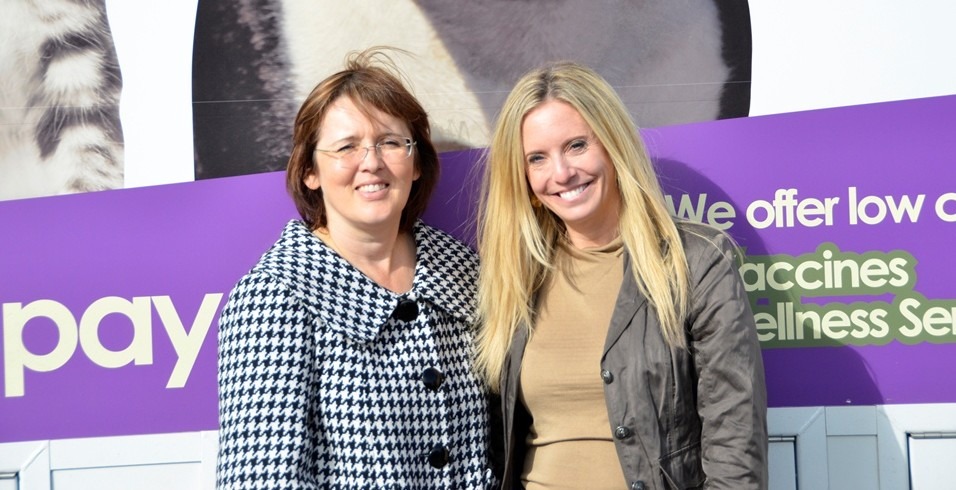
Amber Sitko is President and Founder of All About Animals Rescue, the Spay Michigan organization that launched in 2008. A computer consultant for Microsoft, Amber has always served as a volunteer for All About Animals, never accepting pay for her work. Her love for animals and her professional business background have merged organizational goals with a life-saving mission, evolving from a struggling startup to a $3+ million budget. The result is that since 2008, All About Animals has spayed and neutered over 125,000 cats and dogs, and over 50,000 pets are seen for wellness care services each year. The organization claims the distinction of being the largest high-quality, high-volume, low-to-no-cost spay/neuter nonprofit animal wellness organization in Michigan, and it may be the largest spay/neuter clinic in the United States. We catch up with Amber on another busy and productive day at All About Animals.
USA: Amber, your organization is called Spay Michigan on the United Spay Alliance program locator. Yet your name is more than that: “All About Animals Rescue – No More Homeless Pets.” Can you please paint a picture on who you are and what you offer?
Our primary mission is “No More Homeless Pets”, and to achieve that, we focus on spay/neuter as the number one priority and most effective way to stop overpopulation of pets. A big part of that is Trap-Neuter-Release (TNR) and wellness services also support that. A small piece of what we do is adoption. In 2015, we performed 25,000 spay/neuter procedures, with 60% being cats and 40% dogs. To the best of our knowledge, we are number one in spay/neuter in the entire country (beside the ASPCA, which is a very big organization). We hire our veterinarians part-time, and we have two full-time, so we have 5 or 6 now. We offer wellness services, which benefit animals and the community, and this was a natural extension of our spay/neuter services.
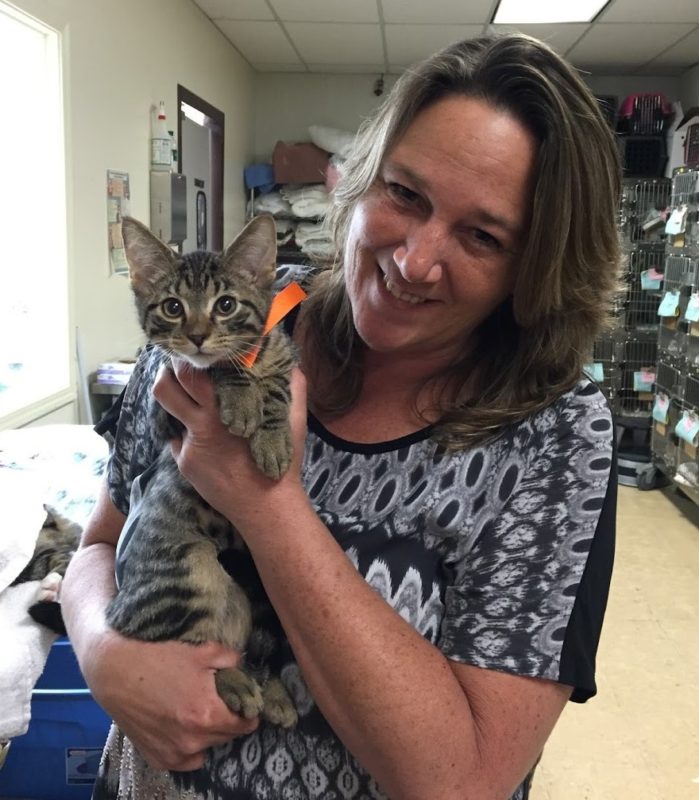
We have grown to be a good-sized organization to meet community needs, with 3 clinic facilities in Warren, Detroit, and Auburn Hills. Our 13,000 square foot building in Warren is our spay/neuter facility. We have a 2,000 square foot location in Detroit and a 1,500 square foot property in Auburn Hills, both of which are our additional wellness practices. Those two locations also serve as pick-up and drop-off for spay/neuter. We also have a mobile surgical unit and 3 transport vans. We have 55 employees and approximately 70 volunteers (in fact, I am a volunteer myself). Our remarkable, dedicated, caring, and loving folks are very passionate about animals. As possibly the largest spay/neuter clinic in the country, the only way we can do all this great work is by having an amazing staff who supports our mission. Our work is exciting and I love it!
USA: Are you an adoption shelter rescue?
We started out as foster-based rescue. We don’t technically “shelter,” but we do sometimes have cats, about 3 to 5 there. We’re pretty much foster-based, with 3 or 4 fosters. One employee handles adoptions and volunteers. We rescue about 40 cats and 15 dogs a year.
USA: How do you help with pet retention, in addition to spay/neuter?
We tapped into Pets for Life, a program of the Humane Society of the United States (HSUS), as part of the first wave of 10 cities they targeted, in collaboration with PetSmart Charities. HSUS provided the mentorship. Unfortunately, PetSmart Charities is in the process of reorganization, and we are waiting to hear if they will continue the current grant programs. If not, this will really leave us in the lurch. But we try to offset our funding with a Wellness Program. Our Marketing and Development Director has a multi-year plan. We can’t rely on grants to fund programs so we are always looking at other ways to find sustainable funding. We engage in intense community outreach with spay/neuter and education, making life better for animals and people.
USA: What populations and communities do you and your team serve?
We serve primarily the working poor. We have a program in Detroit for the severely underserved community, where we literally go door-to-door and talk with pet owners so we can gain their trust and so they, in turn, will entrust us with their pets. They love their pets and want to make sure they will be well taken care of. It means being there every day — “boots on the ground” — never leaving the community, and providing assistance so we can turn a low 10% spay/neuter compliance rate into a high 80% or more compliance rate.
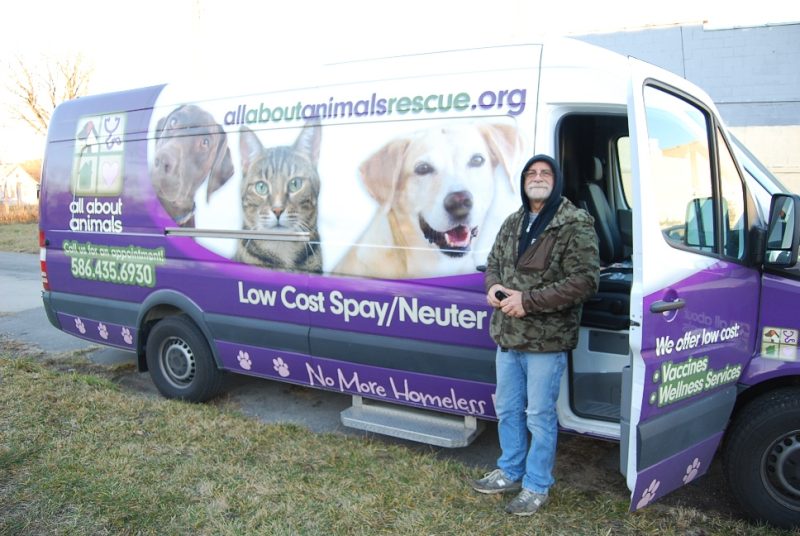
For door-to-door work, it’s important to not be judgmental. For example, some people may tie their dog on a chain outdoors, so you offer a longer chain or ask if you can bring a doghouse. If the animal has fleas, you ask, can I bring you medicine? People can’t afford to feed themselves, let alone their dogs. The average cost to us in this program is $500 for spay/neuter, which includes the labor to send a person out multiple times. You never leave–you’re there for the long run. You are trusted. We are most proud of this Pets for Life program, and it’s also the hardest, yet it helps where it is needed most.
We send transport vans to the “black holes” where high-quality, low-cost spay/neuter programs don’t exist in the State of Michigan. We even send a Mobile Surgical Unit to the Upper Peninsula, approximately a 9-hour drive, for a week once per year, since there are no options there. We routinely send a transport van 2½ hours in one direction to pick up pets–or 150 miles. You can appreciate the territory we cover.
USA: This is amazing community education and outreach. What progress do you see?

Yes, this is our fourth year of Pets for Life. We measure progress by talking to pet owners, documenting information about the pet in our database, which includes if the pet is spayed/neutered. To get the word out in the community, we offer free vaccines clinics so that we can talk with owners and hand out free spay/neuter vouchers. After the clinic, we follow up with the pets and continue that relationship, with a focus on getting that pet spayed/neutered. Typically, over 80% of animals are NOT spayed or neutered. Over time, we’ve been able to turn that into 80% of those pets who ARE spayed/neutered, which is pretty amazing!
Most folks love their animals. You may think they don’t love them, but when you realize they do, you are helping them to help their animals and take better care of their pets. When we go into the neighborhoods, people recognize us and reach out to us now since they trust us. The dogs know the sound of the car and get excited because they know we are coming! This isn’t about marketing or emailing. It is about being there with the people in their community, where they live.
USA: From your inception and in addition to having a great staff, how did you reach your current spay/neuter achievements in Michigan – and the country?

Well, we opened in 2008 with great passion — but also a lot of hard work, and faith! We started the rescue with $11,000 in debt, 200 cats in foster, and no employees! We all pitched in. I have an MBA, and this seems second nature to me, applying goals and business sense with mission. I’m very proud that our budget was over $3 million last year. We are funded through our Wellness programs and surgery charges for spay/neuter (when people can afford it). Service-based prevention provides revenue for the people who can’t afford the spay/neuter surgeries. We also offer dentals and care for sick animals.
I work in the tech industry — for Microsoft — as a computer consultant. I’ve never been on paid staff here at All About Animals, and when we started, I was volunteering every free minute I had. I am really happy to volunteer. Now, although it’s less hands-on for me, my role is more strategic. You have to learn to delegate responsibilities. That’s important. For example, we have a Marketing and Development Director now who does a fabulous job and lets me have more “volunteer-work-life” balance.
USA: What was the turning point when you personally became involved in helping animals?
I’ve always loved animals. I always had planned to volunteer when I retired, but when 911 happened it changed my priorities. Climbing the career ladder wasn’t so important anymore. That was the moment I decided to volunteer to help animals. I still work. I still love my job, but I also love to spend time helping pets.
USA: Do you believe there is a link between animal overpopulation and cruelty?
Yes, there is a link. Animals are easier to find and get. They’re “free” and cheap.
USA: What are All About Animals three most successful or innovative accomplishments?
Spay/neuter.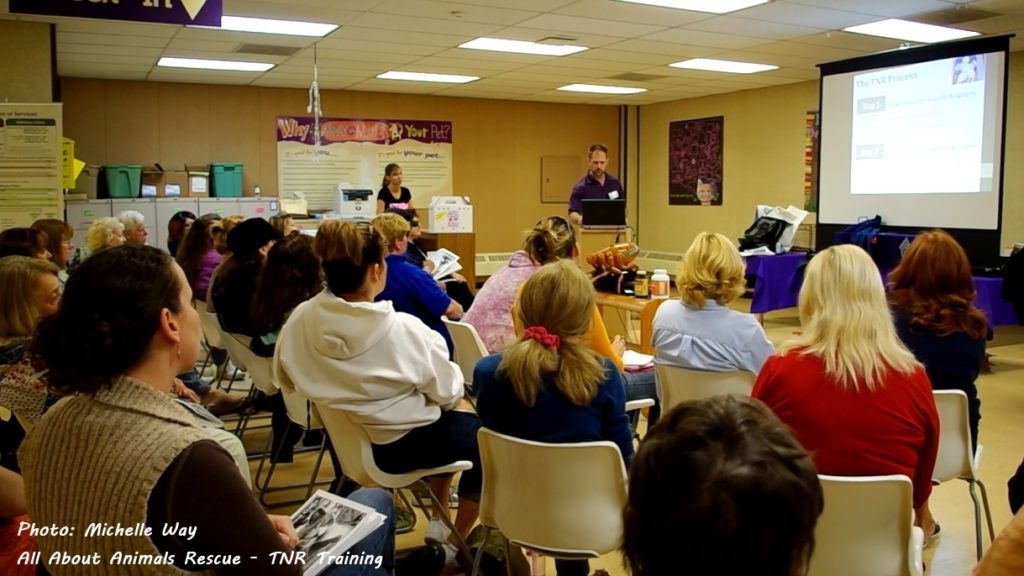
Then TNR, which is critical. Also, we do Shelter/Neuter/Return, a program in which we spay/neuter animals in good condition that come into shelters. Shelters that drop intake numbers are not killing stray and feral cats, so we loan over 200 safe traps to shelters. Some communities have a huge feral cat population, which is a problem we will overcome once we stop that reproduction cycle. We started teaching TNR classes once a month on a Sunday for 3 hours. In 4 to 5 years, we’ve trained over 3,000 people. Spay/neuter is $25, which includes a rabies vaccine and safe trap loan. A LOT of people really do care for feral cats.
And thirdly, the Pets for Life program.
USA: How has your work impacted shelter intakes?
It takes about three years to impact a community. In Warren, with 125,000 people, it was the 3rd largest community with high intakes. Intakes have now dropped 67% and I think we are a large part of that.
USA: What kind of characteristics and needs are unique to your region of the country?
Detroit declared bankruptcy two years ago. Unique for Detroit is Pets For Life, because communities most in need are targeted. There is much abject poverty. Some parts look like Afghanistan, with block after block with no houses. It is a large, spread out city — 130 square miles of city. There are efforts for Detroit to make a comeback, including ideas to turn these barren areas green or possibly into farmland.
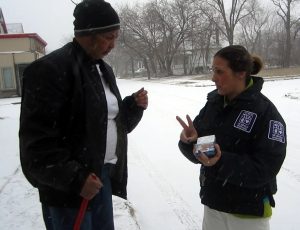
USA: We thank you and your team for working so hard to make progress in ending pet homelessness. What would you tell folks who are interested in starting a spay/neuter program in their region?
I think it’s important to have someone with a business background to manage and start it as a business model, combined with passion and dedication to help animals.
USA: Lastly, please share your program’s relationship with United Spay Alliance and how USA might provide added value.
In our beginnings, we started with Petsmart Charities. Then Marian’s Dream — which shepherded United Spay Alliance as a growing coalition then — granted us $10,000 to start a hotline. I like USA’s networking retreats that engage new people and ideas. USA also provided us the Shelter Buddy program. For the future, USA might consider offering an infrastructure product to state programs that can find spay/neuter addresses nearby with an attractive visual mapping system, like a GPS. To do that for every state — by giving them that software and making it usable. USA could also provide materials for call management and referrals, and templates for veterinarians. But to me, the website visual program locator would be the biggest help.
* * *
All About Animals Rescue is located in Warren, Michigan, and is online at allaboutanimalsrescue.org.

